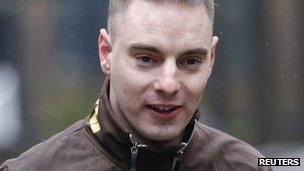UK Lulzsec hacker Ryan Ackroyd pleads guilty
- Published

Ryan Ackroyd was due to stand trial on a number of charges relating to the hacking activity of Lulzsec
A 26-year-old man has pleaded guilty to one count of computer hacking as part of a group known as Lulzsec.
Ryan Ackroyd, from South Yorkshire, admitted to being part of the group, whose targets included the NHS and the UK's Serious Organised Crime Agency (Soca).
He will not face trial on another count of operating a "denial of service attack" (DDoS), which will lie on file.
He and three others on similar charges will be sentenced next month.
Mustafa Al-Bassam, 18, from Peckham, south London, and Jake Davis, 20, from Lerwick, Shetland, have also now pleaded guilty to hacking and launching cyber-attacks.
Ryan Cleary, 21, of Essex, pleaded guilty in June last year to six counts, including hacking into US air force agency computers at the Pentagon.
Ackroyd was due to stand trial charged with taking part in a string of cyber-attacks, but today pleaded guilty to one charge of carrying out an unauthorised act to impair the operation of a computer, contrary to the Criminal Law Act 1977.
'For the lulz'
Lulzsec emerged as a splinter-group of the Anonymous hacking collective in May 2011.
The name stood for Lulz Security - in which "Lulz" is derived from the popular internet term "lol", meaning "laugh out loud".
The group's members employed techniques to flood websites with high traffic - known as DDoS attacks - in order to render them unusable.
Lulzsec claimed to have attacked News International, owner of the Sun newspaper website, on which a false story was planted suggesting that the newspaper's owner, Rupert Murdoch, had died.
In the US, the group was credited with attacking the website of the Central Intelligence Agency (CIA).
Lulzsec had previously posted a story on American broadcaster PBS's website, suggesting that deceased rapper Tupac Shakur was in fact alive.
- Published26 November 2012
- Published15 October 2012
- Published29 August 2012